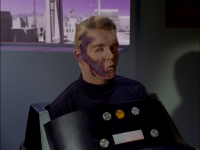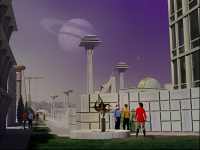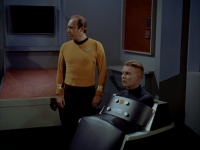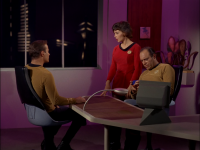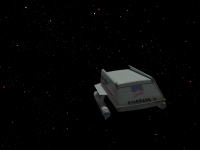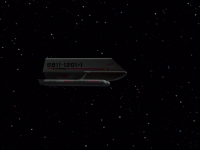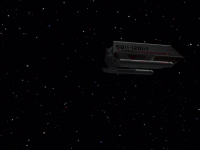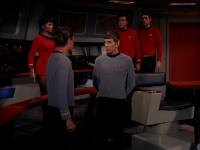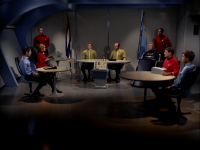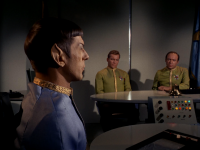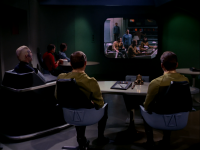Star Trek: The Original Series — 1x11 — The Menagerie, Part I
Synopsis
Spock hijacks the Enterprise to return an injured Captain Pike to Talos IV.
Filler rating: good filler
Neither the first, nor the second part of The Menagerie is essential viewing if you're trying to plow through only Star Trek's essential exposition and stand-out classics, but it's definitely among the better episodes. If you do decide to watch The Menagerie, I recommend skipping The Cage unless you're willing to put up with the clip show to get the additional texture.
Remarkable scenes
- Kirk blindly defending Spock's good name regarding the phantom transmission.
- Spock sneaking around; up to no good.
- Spock fighting with the starbase officer.
- Spock taking over the Enterprise.
- Spock submitting himself for arrest.
- Spock completely outmaneuvering the captain and the commodore at the trial.
Review
Spoiler warning: my review of this episode assumes you've seen Star Trek's pilot episode "The Cage" which is the unaired episode that the clips Spock shows in this episode were originally filmed for. You should be able to find The Cage in the extras either at the beginning or the end of your home video collection. My review of this episode does not discuss or analyze any of the events of The Cage itself, but instead focuses solely on the new events in The Menagerie and assumes that you have already seen The Cage. If you're looking for commentary on the events of The Cage, then please read my separate review of that episode first. If you're not planning to watch The Cage, I recommend waiting to read this review until you've seen both parts of The Menagerie to avoid spoilers.
The Menagerie, Part I is a cleverly written episode which rises above the many already-established cliches in Star Trek to tell a story that is fresh, new, and unique despite it merely being a shameless framing device so that the unaired material of The Cage could be put to good use. Even the title of this episode "The Menagerie" is a reference to one of the lines spoken by Pike in The Cage. As for the actual clip show, I don't know whether it was good preplanning or just some damn fine luck that the Talosians as written in The Cage had the ability to show people illusions, because it provides quite a clever way to substantiate their ability to show the court the entire episode in flashback form.
The crafty way the clip show was integrated into the episode was certainly among its most memorable qualities, but the centerpiece of the story is Spock going off on a crazy quest against orders, then getting caught and having to defend himself in a court martial. Unfortunately the court proceedings are admittedly weakly written. Why is Spock still able to give testimony after having plead guilty? Why should Kirk be punished too because of Spock's actions? Why is the death penalty of all things considered acceptable for such a minor transgression? Why was court declared to be in recess at the end of the episode? What is this recess being used for?
These are all trivial questions and there are some fairly trivial answers to them if you're willing to be imaginative. But they all stick out as minor plot holes the episode was unwilling to explain away and were unnecessary details to begin with. Better writing could have avoided the awkwardness. That said, Spock being put on trial for his actions was a fantastic dramatic choice and Spock having manipulated everything carefully enough so that he could control the court proceedings up until the cliffhanger was a delightful touch. On a related note, Kirk and McCoy debating with each other over whether or not Spock was capable of treachery was a terrific scene and placing the scene just prior to Spock stealing the ship was an excellent counterpoint.
In addition to being the first episode to feature a cliffhanger, The Menagerie is also the first episode to feature a shuttlecraft. The shuttle Kirk and the commodore use to attempt to catch up with the Enterprise is intriguing in its design and capabilities; it was presented much as I would expect a shuttlecraft to be like given the technologies at their disposal during this time period. It was futuristic, high tech, and even roomy by our standards of space travel, but compared with a ship as advanced as the Enterprise the shuttle was scaled down both in size and capabilities. A commendably realistic technological portrayal given what assumptions we can reasonably make about their technological advances from our perspective.
It might be tempting to pick on poor old Captain Pike for his rather pitiful wheelchair that only lets him beep things to communicate, but I felt that the episode did a fine job of substantiating this. McCoy makes a big point about how the study of the brain has advanced little over the years. Given that, even something as simple a rudimentary neural interface is a technology light years beyond anything we've got. Crafting a custom wheelchair just for Pike that allows him limited mobility and limited communication is quite an achievement by itself. Just because these people have transporters and warp drive doesn't mean they're magical wizards. Giving them limitations is what makes them human.
This episode ends on both the most dramatic point of The Menagerie, since Spock seems to have lost control of the situation for the first time in the episode, as well as ending on the most dramatic point of The Cage, when Pike is abducted, which is another nice touch. I was pleased that the first thing that came out of Kirk's mouth upon witnessing the footage was a demand to know how Spock could have created it and I greatly enjoyed how Pike slowly started to come around to Spock's side. For a character who can only beep yes or no, he was surprisingly compelling. Overall, this is easily the best episode so far in what has mostly been a sea of duds.
